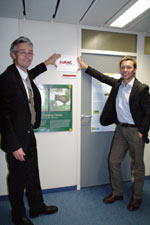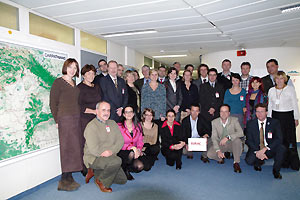UNIS/INF/349
10 December 2009
Carpathian Countries Launch "BIOREGIO Carpathians" Project Proposal
Appeal for EU Programme to Support Sustainable Development in the Carpathian Region;
New EURAC Office Opened at United Nations in Vienna to Support Carpathian Convention
VIENNA, 10 December (UN Information Service) - At a meeting of the Carpathian Convention Implementation Committee (CCIC), being held from 10-11 December at the United Nations headquarters in Vienna, Austria, the Member States of the Carpathian Convention have launched a new transnational project proposal on the management of biological and landscape diversity and regional development in the Carpathian mountains called BIOREGIO Carpathians. The proposal will be submitted to the South East Europe Programme of the European Territorial Cooperation for possible approval of further European Union funding for the region.
The proposed project would strengthen protection and sustainable development of the Carpathian region by developing compatible biodiversity indicators and monitoring systems, harmonizing management plans for the protection of habitats and species and fostering the trans-border connection of the protected areas. Furthermore, BIOREGIO Carpathians will provide an intensive knowledge transfer among stakeholders at all levels and with other mountain regions in order to reach an integrated management approach for the region.
The Carpathians are Europe's largest mountain range, exceptionally rich in species diversity and harbouring species not found anywhere else in the world. Crucially, the region is the last remaining European stronghold of large mammals, such as the brown bear, wolf and lynx. The region also harbours Europe's largest remaining area of virgin forest. Home to millions of people, the Carpathian region is subject to a variety of threats and adverse impacts from land abandonment, habitat conversion and fragmentation, deforestation, large scale migration and at the same time industrialization, pollution and overexploitation of natural resources.
One of the biggest challenges within the next years is the sustainable development of the region by positively linking the protection of the environment with the well-being of the population. To achieve this goal, the Carpathian Convention was signed in 2003 by the Ministers of Environment of the Czech Republic, Hungary, Poland, Romania, Serbia, Slovakia and Ukraine. The Convention provides a framework for cooperation, multi-sectoral policy coordination, a platform for joint strategies for sustainable development and a forum for dialogue between all stakeholders involved. Its Interim Secretariat is located at the United Nations Environment Programme (UNEP) Office in Vienna.
 In order to address the needs of sustainable development of the Carpathian region, the Convention calls for the creation of a new common Carpathian Space Programme within the European regional development policies. The objective is to establish the Carpathian Space as a new operational EU funding programme, in order to address the specific issues of the Carpathian region in a tailor-made manner.
In order to address the needs of sustainable development of the Carpathian region, the Convention calls for the creation of a new common Carpathian Space Programme within the European regional development policies. The objective is to establish the Carpathian Space as a new operational EU funding programme, in order to address the specific issues of the Carpathian region in a tailor-made manner.
A model and successful example of a common initiative for a mountain region already exists since 2000 - the European Union Alpine Space Programme, which promotes competitiveness, sustainable transport, management of nature and the environment, and prevention of natural disasters in the Alps. The Carpathians - a strategic region for sustainable development in Central and Eastern Europe - would greatly benefit from similar support by the European Union.
On the occasion of the current Carpathian Convention meeting in Vienna, a new office of the European Academy (EURAC) was opened in the Vienna International Centre. The office, which will employ two staff, will support the work of the Interim Secretariat of the Carpathian Convention and represent EURAC in Vienna. EURAC, with its seat in Bolzano, Italy, is one of the largest public-private research centres in Italy and assisted the development of the Carpathian Convention since its early days. EURAC's involvement in the Alpine Convention, and its Institutes of Alpine Environment, for Regional Development, for minority rights and for Applied Remote Sensing involving state of the art satellite technologies, are of special interest for sustainable mountain development in the Carpathians.

* *** *
For further information, please contact:
Maria-Emilie
Lichem
UNEP Vienna Office
Interim Secretariat of the Carpathian Convention
Telephone: (+43-1) 26060-5338
Fax: (+43-1) 26060-5338
Further links:
www.unep.org
www.unep.ch
www.carpathianconvention.org
www.fao.org/mnts/intl-mountain-day-en.asp
www.ec.europa.eu/regional_policy/policy/fonds
www.southeast-europe.net
www.central2013.eu
www.alpine-space.eu
www.eurac.edu
www.alpineconvention.org